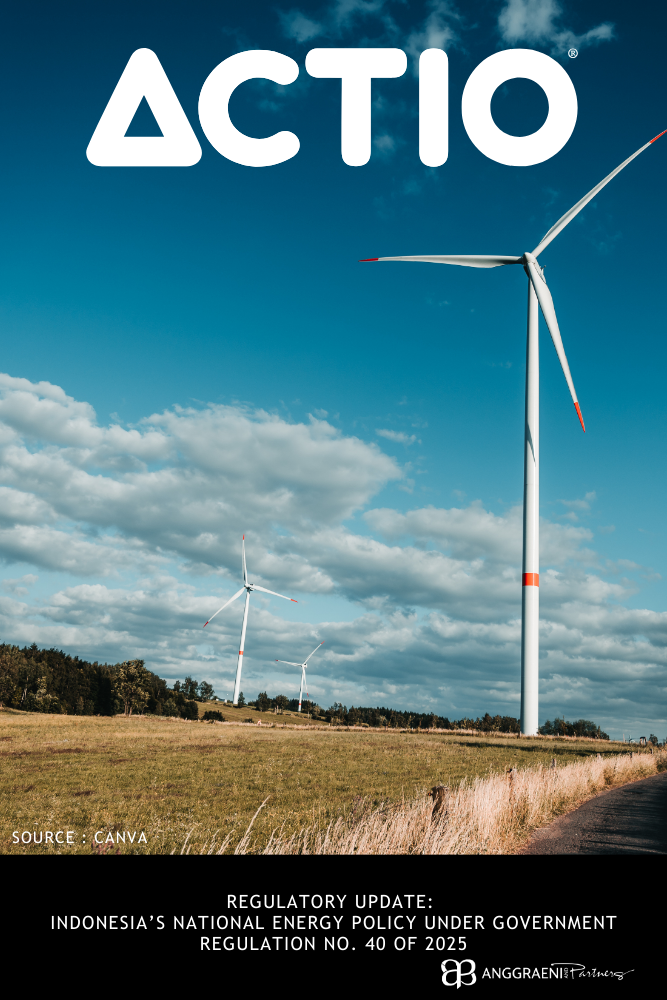- Home
- Capabilities
- ACTIO® Hub
- About Us
- Connect with Us
- AP Library
By Setyawati Fitrianggraeni, Deviana Bella Saputra, Irvena A. Dewanto
Introduction
The utilization of Artificial Intelligence (“AI”) has increased rapidly over the years. According to a study conducted by Goldman Sachs, globally, 18% of occupations have become automatable by AI, and a higher percentage of 44% for occupations in the legal field, specifically in the United States.[1] The presence of AI brings various benefits towards dispute resolution processes, namely, increasing the efficiency and speed of dispute resolution processes.[2] Solomonic and Lex Machina are among others, the AIs utilized within dispute resolution processes.[3] Solomonic is a UK-based litigation analytics platform offering personalized alerts on new claims, case summaries, and predictions on litigation outcomes. Similarly, Lex Machina provides insights into opposing parties’ hearing history, court attitudes, and outcome predictions based on legal strategies. The rising prominence of AI has paved the way for the potential utilization of AI as arbitrators in arbitration proceedings.[4]
Regulations Regarding the Utilization of AI in Dispute Resolution
Currently, Law Number 30 of 1999 concerning Alternative Dispute Resolution (“Arbitration Law”) does not contain any provisions regarding AI arbitrators. At the international level, specifically the United Nations Convention on the Recognition and Enforcement of Foreign Arbitral Awards (“New York Convention”) as ratified by Indonesia through Presidential Decree Number 34 of 1981, no provisions currently prohibit AI arbitrators.
Furthermore, notwithstanding the absence of specific regulations on AI arbitrators, the CIArb Guideline on the Use of AI in Arbitration (2025) (“CIArb Guideline”) provides guidance on AI utilization and risk mitigation measures in arbitration. Point 8.2 of the CIArb Guideline allows arbitrators to use AI to enhance efficiency and accuracy but prohibits delegating decision-making or tasks that could influence procedural or substantive decisions. Point 8.4 emphasizes that arbitrators remain fully responsible for the award, regardless of AI assistance. AI can support, but not replace, human judgment in arbitration. Given the lack of provisions on AI arbitrators, the impact on the validity of arbitration agreements and the enforcement of awards must be further examined.
The Validity of Arbitration Agreements Stipulating the Appointment of AI Arbitrators
Article 1(1) of Law No. 30 of 1999 on Arbitration and Alternative Dispute Resolution stated that the basis of arbitration lies in the arbitration agreement made between the disputing parties. While according to Article 7-9, an arbitration agreement can be agreed upon before or after a dispute arises. Generally, the appointment of an arbitrator is conducted based on the parties’ agreement. Furthermore, Article 13 (1) stated that in the event that the parties fail to reach a consensus regarding the appointment of an arbitrator or in the absence of a provision made regarding the appointment of an arbitrator, the Chairman of the District Court appoints an arbitrator or an arbitration tribunal.
An arbitration agreement appointing an AI arbitrator may be invalid under Indonesian law if it fails to meet the requirements of Article 1320 of the Civil Code, in this case, the condition of having an admissible cause. This raises questions as to whether such an appointment complies with legal standards for valid agreements. Article 1 Number 7 of the Arbitration Law specifically defines an arbitrator as a person or more, excluding non-human entities. Article 12 paragraph 1 of the Arbitration Law further sets requirements for the designation or appointment of arbitrators, among others, legal capacity and a minimum age of 35. These are qualities attributable to humans. Additionally, under Article 1330 of the Civil Code and related regulations, only certain individuals may validly conclude agreements.
In relation to whether AI constitutes a legal subject, generally, Article 57 paragraph (12) of the European Union Artificial Intelligence Act 2024 provides that liability for damage inflicted on third parties rest on AI providers and prospective providers, not on the AI itself. Furthermore, in Indonesia, due to its characteristics in the automation of information processing, AI can be categorized as an Electronic Agent,[5] namely, a device of an Electronic System that is made to perform an action on a certain Electronic Information automatically organized by a Person.[6] In this case, a person refers to an individual, an Indonesian citizen, a foreign citizen, and a legal entity.[7] The definition of AI in the Information and Electronic Transaction Law above suggests that legal liability is borne by the electronic system organizer that provides AI services.[8] Having considered the lack of certainty regarding the status of AI as a legal subject, appointing it as an arbitrator may, therefore, render such an arbitration agreement null and void[9] for lacking an admissible cause.
The Enforcement of Foreign Arbitral Awards Rendered by AI Arbitrators
The use of an AI arbitrator in a foreign arbitral award may raise enforceability issues under the New York Convention. Article V(1) allows refusal of recognition for procedural or substantive defects, including invalid arbitration agreements. If the appointment of an AI arbitrator renders the agreement invalid, recognition of the award may be denied under Article V(1)(a). Additionally, Article V(2) permits refusal if the subject matter is not arbitrable under local law or if enforcement would violate the public policy of the enforcing country, the latter of which may become relevant when AI arbitration is in question. The concept of public policy is defined differently in each country. Article 1 Number 9 of SCR 3/2023 defines public policy as the foundational elements of Indonesia’s legal, economic, and socio-cultural systems. If a country prohibits AI arbitrators, an award rendered by AI may be deemed to violate its public policy. Ultimately, the enforcing court determines whether such a violation exists.[10]
Conclusion
In conclusion, while neither Indonesian Arbitration Law nor international conventions explicitly ban AI arbitrators, they also do not recognize them as valid. The CIArb Guideline (2025) allows AI use only as a supportive tool, with full responsibility resting on human arbitrators. Indonesian law requires arbitrators to be human, making agreements appointing AI potentially invalid for lacking an admissible cause. Likewise, foreign awards by AI arbitrators may face enforcement challenges under the New York Convention if deemed contrary to public policy. Overall, the possibility of AI’s role as an arbitrator in a binding arbitration remains legally uncertain and requires clearer regulation.
For further information, please contact:
WWW.AP-LAWSOLUTION.COM
P: 6221. 7278 7678, 72795001
H: +62 811 8800 427
S.F. Anggraeni
Managing Partner
fitri@ap-IawsoIution.net
Deviana Bella Saputra
Middle Associate
Irvena Ayunya Dewanto
Junior Associate
irvena.ad@ap-lawsolution.net


